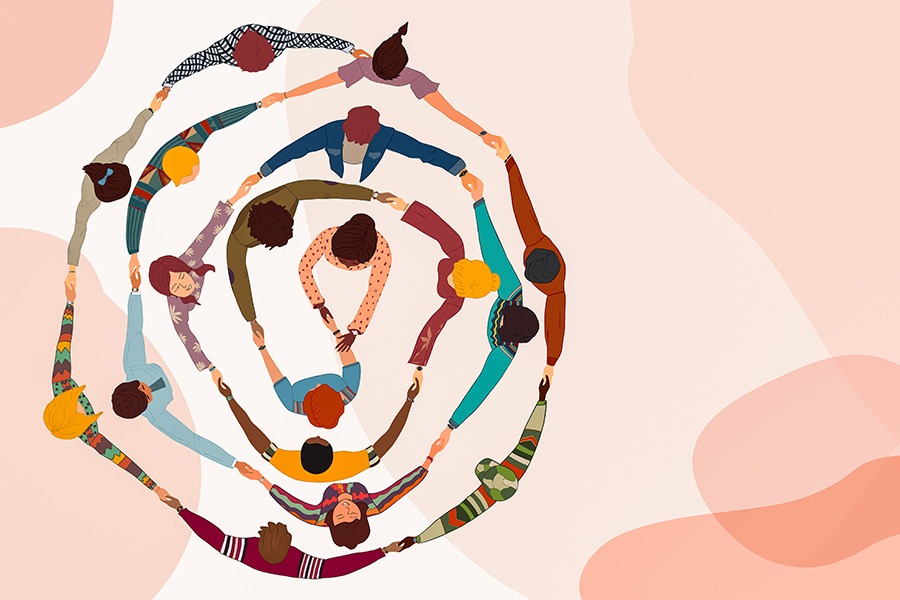Women network differently. Here’s why, and how
An increasing number of platforms are enabling women to connect with one another by breaking the boundaries between the professional and personal.

Having the right circle of women around you is honestly the biggest life upgrade,” announced a post on Instagram. Radhika Iyengar, India country director for Women in Tech, can vouch for the accuracy of that statement. Iyengar, 47, who lives in Hyderabad, had an important work event to attend. But she couldn’t leave her child alone. That’s when some members from Women in Tech, an organisation that champions diversity in STEM, offered to help so that she could make it to the event.
Sakshi Agarwal, 37, as a community manager at Slurrp Farm regularly used to meet “mom” groups across South India for networking purposes. It’s been several years since her job changed, but some of the mothers she connected with back then are still in touch. Currently, the head of brand and strategy at Ella Foods, Bengaluru-based Agarwal says she has become friends with some of the mothers she used to interact with and has also collaborated and worked with them on different projects, much after moving on from her role as community manager.
It’s instances like these, Iyengar feels, that highlight one of the key qualities of how women network and work—unlike men, their connections go beyond mere work and deals—as also one of the reasons why women need to network differently from men.
In the modern organisation, the equation is not as simple as “work hard and success will follow”. It also matters who notices you doing the hard work and who you have access to. This is where networking is vital. It is no secret that golf and weekday informal drinks among men are all about networking and not for the love of the game or an appreciation of the art of mixology. Men are direct, intentional and strategic in their networking. “Men are more adept at purposeful networking and seeking out formal and informal avenues to grow their professional connections. Women usually have great social skills but often hesitate when it comes to leveraging their social networks for strategic professional advantage,” says Richa Kale, 43, HR head at Egon Zehnder Information and Research Services Pvt Ltd.
A study titled ‘Reaching for the Stars: How Gender Influences the Formation of High-Status Collaboration Ties’ published in the Academy of Management Journal last October noted that across the working world, traditionally masculine behaviours are the yardstick for measuring potential and performance, which is a huge barrier for women. Highlighting another reason why women do not network like men, Kale, also a co-founder at Lead Like Her Tribe, a networking group for women HR leaders in the National Capital Region, says, “Women network differently because they have learned to navigate these challenges and need different strategies to achieve their professional goals through networking.”
It is a well-documented fact that women are the primary caregivers and undertake the larger share of domestic and familial duties. HRX’s chief strategy advisor Pallavi Barman, 40, says no matter how much she wishes to attend a late-night networking event or dinner, if the situation is against her getting away from home, she would either skip it or delegate it. “I am not saying I can’t do it, but there is a limited number of hours in a day and the flexibility of using that time as per my discretion is also limited. Time isn’t such a big constraint for most men, so it’s usually easier for them,” says Barman. Moreover, if a post-work networking dinner is with someone of the opposite sex, things get complicated for women as this could be readily misconstrued.
Perhaps, the most compelling reason for women to network differently is the fact that women who try to network like men fare poorly. A study by a team from Kellogg School of Management published in 2019 found that “women who have networks that resemble those of high-placing men are low-placing, despite having leadership qualifications comparable to high-placing women.”
Relational not transactional, empathy not aggression
A friend tricked Thirtha Uthappa, 43, into attending a Business Networking International’s (BNI) breakfast event in Bengaluru recently. “I didn’t want to attend any BNI event because of their reputation of being hardcore. By the end of the meet, they actually calculate how much business they are likely to generate that day and announce the estimates. It was all so stressful,” recalls Uthappa, an entrepreneur who launched her customised sustainable jewellery business Samaara Jewellery in 2015 after spending close to a decade at KPMG.
Uthappa realises networking is extremely important for her as an entrepreneur and has come a long way from her KPMG days when she felt talking to someone for just work and nothing else was extremely selfish, almost dirty (a study proves her point), and so stuck to washing down cookies with cups of tea at the networking events KPMG bosses sent her to. “All conversation at those events was packed with great intent. I found that odd,” she says. Another reason she thinks many women aren’t comfortable at networking events, where men outnumber women generally, is because “women tend to overthink and wonder if they would come across as selfish, brash or too aggressive if they initiate contact.”
Like other women who network, Uthappa and Agarwal don’t keep things transactional. She talks about more than merely what she does and mutual benefits. “We would start with a genuine interest or compliment on someone’s clothes or bag. Conversations with other women start easily with casual comments and even when we talk about work the tone remains friendly. And if someone has kids, there is added respect because we understand the challenges of a working mother. There is empathy when women network,” says Agarwal. Women always connect on both professional and personal levels, explains Garima Dhamija, 50, co-founder of Lead Like Her Tribe and an HR professional.
Women’s networking is relational, notes Dhamija. “Women build relationships that go beyond work and deals. That’s one reason why women get more referral work than men. Relational networking isn’t leveraged enough in workplaces at present. In fact, women who might have met in networking situations maintain connections long after their jobs and roles have changed and are more likely to collaborate compared to men,” adds Dhamija, who has more than once spent connecting about everything but work during a business meeting with a fellow woman. Uthappa agrees with Dhamija, saying, “It’s not just transactions but the bonds we have created that are important.”
This focus on forming bonds works well for women. The Kellogg School of Management study quoted above found that successful women have an inner circle of predominantly women who they can call and depend upon. Women, especially in India, find it safe and natural to open up to other women. Most women’s relationships, particularly those with female peers, are stickier and deeper than men’s as they relate on personal and professional fronts and the relationships grow stronger over time, says Dhamija. “They also share about important work that they might have done and share experiences that helped them succeed. It thus enables something that may not be possible in mixed group networks,” she adds.
Focus on community
Last year, Uthappa joined the all-women group Ladies Who Lead where she gets to meet and network with other women during their events, retreats and meetings without the pressure of business and deals. “With this group, there is no push for networking, yet it creates a channel for doing so. The vibe is friendly and we connect over our children, ideas, challenges and successes too,” she says. What Uthappa found with Ladies Who Lead is exactly what Agarwal found with the mom’s groups and Ficci Ladies Organisation (FLO)—a community. While networking women search for a community that they can count on. That’s what Kale and Dhamija are trying to create with their Lead Like Her Tribe, and what Women in Tech is attempting to provide for women in the IT and science industries. The numerous women-only networking groups, such as Leap Club and Her Entrepreneur Network (HEN), that have sprouted in recent times all want to create a community that lifts fellow women in all walks of life.
While women-only networking groups have been around since the 1980s, they grew in popularity once the Covid-19 pandemic hit. It was at these communities where women shared their experiences, discussed their challenges and through dialogue and collective thinking found solutions to problems both at home and work. “Women-only networking groups are geared to address the real-world challenges faced by women. By creating safe spaces through their interactive circles, skill building work, mentorship and sponsorship initiatives, these networks are amplifying the voices of women professionals,” says Kale.
Now that things are not as uniquely challenging, these groups are helping women turn their ideas into startups. “These communities are empowering, especially for those women who need avenues to be seen and heard, mingling and growing their clout and harvesting grounds,” says Barman.
Bring your authentic self
Despite all the talk about gender parity in India Inc, we continue to see all-male panels in the conferences of traditional professional networks, low percentage of women in the workforce and an even lower presence in the board room and leadership roles. “Whether you look at anecdotal experience or empirical research, we can conclude that the need for women-only networks continues to be strong,” says Kale.
Men are usually aggressive, strategic and intentional about whom they meet and never lose an opportunity to talk about their achievements, influence and deals. “Over a period of time, bold claims and casual conversations about achievements can influence senior leaders to form competence perceptions that are gender skewed,” says Dhamija.
The first step to address this issue for Dhamija is that women should park the idea of being overly self-promotional and connect with people across functions, levels and geographies. “Networking is not just for extroverts. An easy way to get into conversations is to be interested in other people.
Most of my relationships with other women have begun because I have been interested in them, in their career and in their challenges. Women should also let go of the idea that networking is insincere. They can easily approach it by bringing their authentic self… that can mean just offering support, or sharing quick mentoring tips and experiences that have shaped them,” she says.


























